Deposit Systems
System Overview
The system is designed to promote the collection and reuse of empty containers by providing economic incentives. These incentives include a deposit paid by consumers for empty containers and handling fees paid by producers (manufacturers) who are responsible for reusing the containers

Deposit-Eligible Businesses
The containers subject to deposit for reuse include soju, beer, soft drinks, and similar products.
Deposits are applied to over 100 different products from 14 manufacturers that produce reusable empty containers.
Soju Manufacturers
- Kumbokju Co., Ltd.
- Bohae Brewery Co., Ltd.
- Daesun Distilling Co., Ltd.
- Shinsegae L&B Co., Ltd.
- SeonYang Soju Co., Ltd.
- Chungbuk Soju Co., Ltd.
- Lotte Chilsung Beverage Co., Ltd.
- HiteJinro Co., Ltd.
- Muhak Co., Ltd.
- Hallasan Soju Co., Ltd.
Beer Manufacturers
- Lotte Chilsung Beverage Co., Ltd.
- OB Beer Co., Ltd.
- HiteJinro Co., Ltd.
Soft Drink Manufacturers
- Lotte Chilsung Beverage Co., Ltd.
- Ilhwa Co., Ltd.
- Coca-Cola Beverage Co., Ltd.
Operational System
Process of Reusing Empty Containers
- Production/Reproduction Stage
- Sales Stage
- Consumption Stage
- Return of Empty Containers and Refund of Deposits
- Collection Stage
- Transportation by Alcoholic Beverage and Soft Drink Companies
- Sterilization and Cleaning Stage
Management System for Deposit and Handling Fee Payments


Deposit Amount for Empty Containers
| Capacity |  Less than 190ml Less than 190ml |
 190ml to Less than 400ml 190ml to Less than 400ml |
 400ml to Less than 1,000ml 400ml to Less than 1,000ml |
 1,000ml and Above 1,000ml and Above |
|
|---|---|---|---|---|---|
| Deposit Amount | 70 won/ea |
100 won/ea |
130 won/ea |
350 won/ea |
|
| Handling Fee | Total | 32 won/ea |
36 won/ea |
38 won/ea |
|
| Wholesalers | 20 won/ea |
23 won/ea |
24 won/ea |
||
| Retailers | 12 won/ea |
13 won/ea |
14 won/ea |
||
Roles of Stakeholders
When purchasing a product, they pay a certain amount as a deposit. After using the product, they return the empty container to a retail or wholesale store and receive a refund of the deposit.
They manufacture products that include a deposit, reuse the returned empty containers, and bear the associated costs, such as handling fees, incurred during this process.
Since 1985, Korea has implemented the deposit system under the "Act on the Promotion of Saving and Recycling of Resources" and its subordinate regulations. These laws specify the products subject to the deposit, the deposit amount paid by consumers, and the handling fees borne by producers.
They receive handling fees to cover the costs of storage and transportation incurred during the return process.
Annual Status of Empty Container Shipments and Collections
| Categories | 2016 | 2017 | 2018 | 2019 | 2020 | 2021 | 2022 | 2023 |
|---|---|---|---|---|---|---|---|---|
| Shipment Volume | 5,226 | 5,109 | 4,885 | 4,723 | 4,216 | 3,739 | 4,184 | 4,161 |
| Collection Volume | 4,974 | 4,952 | 4,810 | 4,653 | 4,125 | 3,650 | 4,034 | 4,038 |
| Overall Collection Rate | 95.2% | 96.9% | 98.5% | 98.5% | 97.9% | 97.6% | 96.4% | 97.1% |
| Consumers Direct Return Rate (Household Use) | 29.0% | 50.9% | 58.8% | 60.5% | 61.1% | 63.5% | 63.8% | 65.2% |
Subject to change based on the settlement of shipment and collection volumes